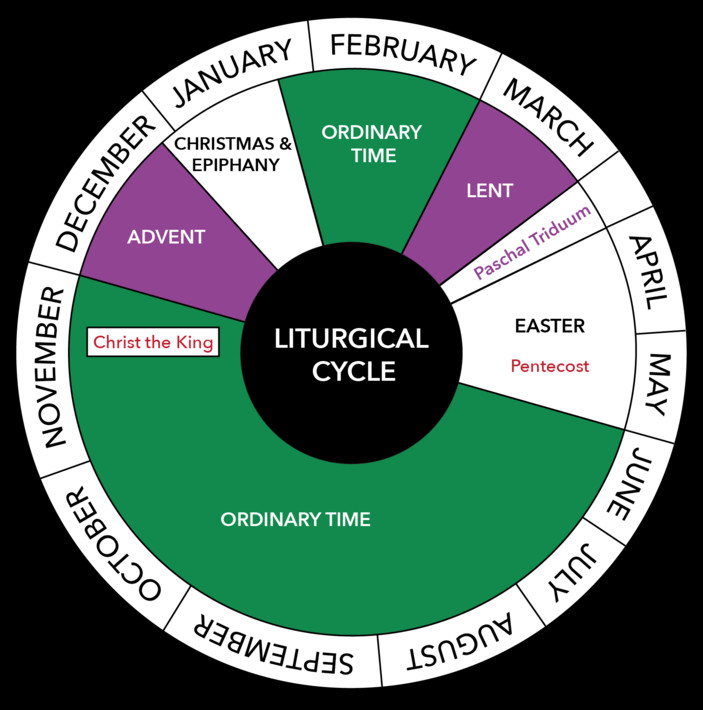Understanding the Liturgical Year and Cycle C
The Catholic liturgical year, a vibrant tapestry woven with seasons of Advent, Christmas, Lent, Easter, and Ordinary Time, follows a three-year cycle (A, B, C) to ensure a comprehensive exploration of Scripture. This year, 2024, marks the commencement of Cycle C, a cycle that, according to the United States Conference of Catholic Bishops (USCCB), begins on the first Sunday of Advent and concludes on the Saturday after the solemnity of Our Lord Jesus Christ, King of the Universe. This cyclical approach, established by St. Paul VI's Missale Romanum, ensures that a significant portion of the Bible's treasures is unveiled to the faithful over a three-year period. As Pope Francis addressed in his Angelus address on the first Sunday of Advent, this is a time for spiritual vigilance, to “stand erect and raise your heads” in the midst of global anxieties.
The Unique Readings of Cycle C
Each liturgical cycle offers a unique perspective on the Gospel narratives. Cycle A predominantly features readings from the Gospel of Matthew, Cycle B from Mark, and Cycle C, the current cycle, focuses primarily on the Gospel of Luke. While the Gospel of John is typically reserved for Easter, Cycle C showcases the narrative's distinctive lens on the life and ministry of Jesus. The readings from the Acts of the Apostles in the Easter season are complemented by the Revelation in Cycle C. The liturgical calendar also allocates specific readings for weekdays, or 'ferias,' with unique texts for Lent, Advent, Christmas, and Easter, ensuring a rich and diverse liturgical experience throughout the year.
Ordinary Time Readings
Even during Ordinary Time, the readings in Cycle C possess a unique arrangement. While the Gospel readings follow a yearly cycle, the first readings, from the Old Testament and the apostolic letters, follow a two-year cycle (odd and even years), enhancing the variety and depth of biblical insight throughout the year. The Second Vatican Council, through the Constitution on the Sacred Liturgy, Sacrosanctum Concilium, championed this cyclical approach, aiming to open the treasures of the Bible more fully to the faithful during Mass, enriching the understanding and experience of the liturgical year. This ensures that over time, a wide range of Scriptural passages is read, providing a comprehensive experience of the breadth and depth of the Bible.
Advent: A Season of Hope and Preparation
Advent, the season of preparation for the coming of Christ, is a time of expectant waiting and joyful anticipation. It is a time for reflection, prayer, and spiritual growth, as we prepare our hearts to welcome the Christ Child into our lives. The message of hope resonates throughout Advent, offering solace amid the challenges and uncertainties of life, echoing the Pope's message of hope and peace in the face of global conflict.
Embracing the Advent Season
Many traditions accompany this period, such as Advent wreaths, calendars, and Jesse Trees, which serve as visual and spiritual reminders of the true meaning of Christmas. These rituals, along with engaging in acts of mercy, further deepen the spiritual significance of the season. Confession is a traditional way of clearing the mind and heart at the start of the new liturgical year.
The Significance of Cycle C in Advent
The selection of Cycle C for Advent 2024 provides a unique opportunity to reflect on the themes of hope, peace, joy, and love, central to the Advent season. The Gospel readings from Luke offer a specific perspective on these themes, enriching our spiritual journey during this time of preparation for Christmas. As the Moderator of the General Assembly of the Church of Scotland, Rt Rev Dr Shaw Paterson, emphasized, Advent is not just about the birth of Jesus, but about the significance of his life, death, resurrection, and the Kingdom of God. It’s a time to reflect on why Jesus came into the world and the message of hope that he brought for humanity. This message transcends geographical boundaries, aligning with Pope Francis' call for global peace and unity amidst present anxieties and upheavals.
A Season of Reflection and Renewal
As the liturgical year begins anew with Advent 2024, Cycle C offers a fresh perspective on the familiar stories of Scripture, inviting us to deepen our understanding of the Christian faith and the transformative power of Christ’s presence. The readings encourage us to prepare not merely for the celebration of Christmas, but for a deeper engagement with the message of hope and redemption that lies at the heart of the Christian faith. The liturgical year's cyclical nature reflects the ongoing nature of our spiritual journey, a journey marked by both darkness and light, uncertainty and hope, reflecting the reality of life as well as the promise of hope.
This Advent, let us embrace the liturgical cycle C's unique narrative, allowing its message to renew our faith and guide us towards a deeper understanding and appreciation of God's grace and love.
The message of hope continues to resonate, even amidst the challenging geopolitical situation. Pope Francis' call for peace, particularly concerning the situation in Lebanon, Syria, and Ukraine, serves as a poignant reminder of the importance of maintaining hope and working towards peace in the face of global conflict. This, in essence, is what Advent calls each of us to consider and act upon. We must seek this peace and unity in our actions, our words, and our hearts, for the sake of humanity and a hopeful future. It’s a quest for peace that is not the responsibility of a select few, but the shared responsibility of all. Let us strive to embrace the spirit of peace and harmony in our lives, for the betterment of humanity.
The season of Advent and Cycle C remind us of the importance of hope, peace and unity, regardless of our personal challenges or global upheavals. Let us use this time to prepare our hearts for the coming of Christ, and to strive for a better world filled with love and compassion. This is a time to pray for all those impacted by conflict worldwide, offering hope, peace, joy, and love to those affected by war and instability around the globe. Let us not succumb to cynicism or apathy, but strive to keep our hearts open to the light and hope that Advent brings.

















